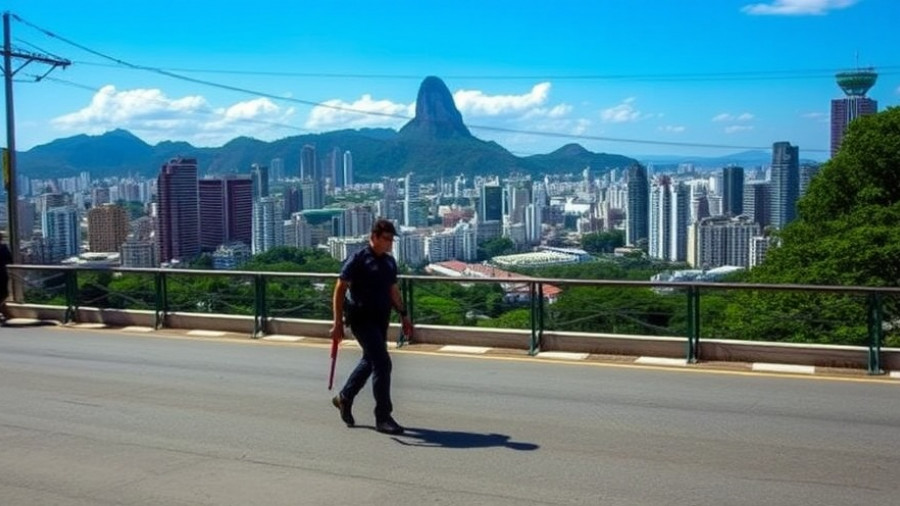
Violencia en las Favelas: La Nueva Realidad de Río de Janeiro
En una madrugada que cambiaría la narrativa sobre el narcotráfico en Brasil, un operativo policial en Río de Janeiro culminó en una tragedia que cobró la vida de al menos 64 personas, incluidos cuatro oficiales de policía. Lo que comenzó como un esfuerzo intentado para desmantelar al grupo criminal Comando Vermelho, se tornó en un tiroteo masivo que dejó a la ciudad en estado de shock. Las imágenes que se difundieron de la desesperación y el caos desatado en las calles resonaron en un ecosistema ya de por sí fracturado por la violencia y el miedo.
Un Operativo Mortal: Más que Números
Este operativo, que involucró a más de 2,500 agentes, fue calificado por el gobernador del estado, Cláudio Castro, como “una guerra” contra el narcotráfico. Sin embargo, la nomenclatura de "narcoterroristas" ha sido objeto de crítica, con algunos analistas sugiriendo que refuerza una retórica política más que una estrategia efectiva para combatir el fenómeno delictivo. A pesar de los 64 muertos, se plantean cuestionamientos sobre quiénes eran realmente las víctimas: ¿eran todos criminales o había una gran cantidad de civiles inocentes atrapados en medio de esta violencia?
El Impacto en la Comunidad: Historias de Desesperación
A medida que los disparos resonaban, los residentes de las favelas vivieron momentos de pánico. Una peluquera, que sufrió una herida en el gimnasio, relató cómo la vida cotidiana se transformó en un campo de batalla. La comunidad no solo enfrenta el trauma inmediato, sino también el impacto prolongado de este tipo de operaciones policiales, que muchas veces dejan más que estándares de criminalidad; arrasan con el tejido social y genera desconfianza entre los ciudadanos y las fuerzas del orden.
Modelo de Respuesta: Una Estrategia Fallida
La respuesta violenta que se ha visto en Río no es una anomalía. De hecho, las operaciones policiales en favelas han sido comunes, pero la mortalidad de este operativo es un llamado a repensar las estrategias. Con el gobierno del presidente Luiz Inácio Lula da Silva criticado por falta de apoyo, la situación plantea interrogantes: ¿Es esta la mejor manera de abordar el narcotráfico? Expertos en conducta y política social sugieren que el enfoque debería ser más sobre prevención y rehabilitación, ofreciendo a los jóvenes en riesgo alternativas a la violencia y al crimen.
La Necesidad de Tratamientos Efectivos en la Comunidad
Mientras la confrontación directa con las bandas criminales continúa, también lo hacen las complicaciones que surgen del abuso de drogas. En este contexto, es vital parlar sobre tratamientos de rehabilitación para aquellos atrapados en la trampa del narcotráfico. Programas de desintoxicación, rehabilitación y apoyo familiar para la adicción son fundamentales. Comunidades alrededor del mundo están comenzando a reconocer que, al abordar el problema a través de terapias conductuales e intervenciones familiares, pueden cambiar la narrativa de violencia que ha asediado a lugares como Río de Janeiro.
Conclusión: Caminos hacia la Esperanza
A medida que las noticias de este operativo recogen atención internacional, es esencial que la respuesta de la comunidad y de los líderes vaya más allá de la mera represión. La creación de espacios seguros mediante programas de recuperación y educación, como Alcoholics Anonymous y Narcotics Anonymous, puede ofrecer un rayo de esperanza no solo para aquellos en desgracia pero también para comunidades enteras que merecen paz. La intervención no es un camino fácil, pero transformarlo en un enfoque comunitario puede ser el cambio que muchas familias necesitan para rescatar a las generaciones futuras de una vida de crimen y desolación.
Es hora de actuar. Si usted o alguien que conoce está luchando con problemas de adicción, busque soluciones efectivas y apoyos disponibles en su área.
 Add Row
Add Row  Add
Add 




Write A Comment